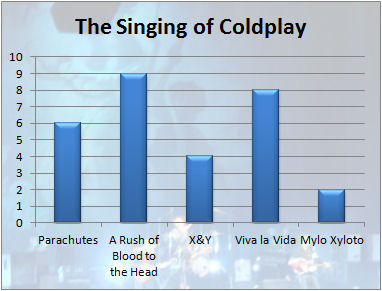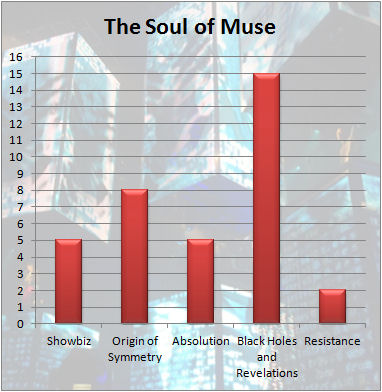The Singing of Coldplay vs. the Soul of Muse
June 6, 2012 Leave a Comment
If you’re a fan of either Coldplay or Muse, you’ve probably noticed one thing: one word gets repeated a lot.
For Coldplay, it’s some form of “sing.” Sometimes it’s a story about someone else singing; sometimes lead singer Chris Martin is making clear that he, at that moment, is singing.
For Muse, it’s “soul.” Lead singer Matt Bellamy has a soul, and it’s being perturbed in some way, or someone else’s soul is suffering a terrible fate, or whole swaths of souls are being wiped out in an apocalypse. It happens.
It’s no surprise that the two bands fall into similar patterns. Coldplay and Muse share a number of characteristics, after all.
- They are both British.
- Both have been around since the very late ’90s.
- Both have released five studio albums (at least until Muse’s The 2nd Law comes out in September).
- Both take a rather majestic approach to pop rock.
- Both lead singers (and main songwriters) are in long-term relationships with blonde American actresses.
You might find yourself wondering, “How do these two bands’ obsessions with one word compare to each other?” I hope to provide at least some insight into that burning question. I will concentrate on the five studio albums, simply because a line must be drawn somewhere as to what “counts,” and drawing the line at an obvious similarity between the bands makes for the most relevant analysis. For that reason, Coldplay’s Prospekt’s March EP is not included, and neither is Muse’s Hullabaloo rarity compilation, for example.
Singular and plural forms of the noun “soul” will count, as will all verb tenses of “sing” – though I won’t count the noun “song,” because it has a distinct meaning. Counts are based on the lyrics as posted on the bands’ respective Web sites, which I believe match actual counts as recorded. Tracks that annoyingly contain two songs on Coldplay’s Vida la Vida are counted as one.
First, let’s take a look at the ten albums as whole entities. How many times does “sing” or “soul” appear?
It is worth noting that by Mylo Xyloto, the usage of the word “song,” at three instances, has surpassed that of all forms of “sing” in Coldplay’s music. But what you probably noticed first was that big spike at Muse’s fourth studio album. Did Bellamy just go crazy with writing “soul” into every song? Actually, no.
That 39th red song is “Supermassive Black Hole” from Black Holes and Revelations (or the Twilight soundtrack, if you’re one of those). It’s what I believe statisticians call an “outlier” because it’s so far off the map compared to all the other data. (NOTE: I am not a statistician, just a dork with Excel.) The line “You set my soul alight” repeats a lot during that song – multiple times during each chorus. Every chorus line repeats a bunch, actually; repeats aren’t excluded in any graph above, but if they were, it would have a much bigger effect on “Supermassive Black Hole” than any other song. Even if each chorus were counted as only one instance of “soul,” it would bring down the bar on Black Holes and Revelations so that Muse’s graph would look remarkably like Coldplay’s.
Is this progression of obsession (moderate, high, moderate, high, low) with one word common across all bands, or some with certain characteristics? Is it more noticeable in a breakout hit like Coldplay’s Clocks, when the word is stuck in fairly nonsensically? Is Coldplay’s generally higher usage in songs where it appears or Muse’s use in more songs more indicative of said obsession?
One thing is clear: Obsession Progression would be a great album name. Jazz, probably.







